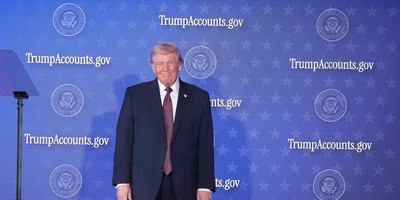It’s easy for Thanksgiving to boil down to little more than turkey, football and travel delays, but many Americans strive to make it more meaningful. They try to take the focus off of our problems and to reflect on our many blessings.
As well they should. Consider the example set by Abraham Lincoln. Our 16th president was in the middle of a bloody and protracted civil war when he issued his Thanksgiving Proclamation. “The year that is drawing toward its close has been filled with the blessings of fruitful fields and healthful skies,” it began.
And frankly, we should be grateful for our problems as well. We rise in life to the degree to which we can solve problems. Time and again, from Valley Forge to 9/11, Americans have faced our problems squarely -- and solved them.
But will we always be a nation of problem solvers? Will we always enjoy the unique satisfactions that problem solving brings?
Nearly two centuries ago, Alexis de Tocqueville, a French aristocrat visiting America, issued a dire warning. All democracies, he declared, have a tendency to succumb to a centralized form of government that promises to solve every problem, but in the process saps its citizens of their courage, and robs them of their spirit.
At that point, the power of government “takes charge of assuring their enjoyments and watching over their fates,” he wrote. “It seeks only to keep them fixed irrevocably in childhood; it likes its citizens to enjoy themselves provided that they think only of enjoying themselves. … It provides for their security, foresees and secures their needs, facilitates their pleasures, conducts their principal affairs, directs their industry, regulates their estates, divides their inheritances: can it not take away from them entirely the trouble of thinking and the pain of living?”
Recommended
Americans must never succumb to such a power, which would reduce us to “nothing more than a herd of timid and industrious animals of which the government is the shepherd.” Such a “soft despotism” would provide us with cradle-to-grave security, but at the cost of our humanity. As social scientist Charles Murray has written, responsibility is what keeps our lives from being trivial.
Problem solving makes us stronger, smarter and more confident. Without the ability and the responsibility to solve the problems we encounter on a regular basis, neither success nor happiness is possible.
Historically Americans have risen to every challenge and have seen opportunities in every problem we have encountered. But the ambition of the modern welfare state is to eliminate problems entirely and provide a government guarantee of security for all.
“The real threat is that the promise of American life will be frittered away for a bag of magic beans called security,” Jonah Goldberg writes. “Many progressive seem to think that we can transform America into a vast college campus where food, shelter and recreation are all provided for us, and the only crime is to be mean to somebody else, particularly a minority.”
Such a problem-free state of affairs would affect not only domestic policy. The ramifications of the welfare-state mentality also extend to foreign policy. Under such a mindset, Irving Kristol points out, “The most powerful nations in the world -- economically, technologically, even militarily -- will become citadels of resistance and nothing more.”
Is the United States destined to become nothing more than a “citadel of resistance” to the crimes and outrages of rogue states and terrorist networks? Or will a vigorous and self-confident United States continue to set the political, economic and intellectual agendas for the rest of mankind in the 21st century, just as it has in the 20th century?
Much depends on the strength of the American spirit -- and on the refusal of ordinary Americans to be seduced by the false promises of the welfare state: a secure, affluent and problem-free existence.

























Join the conversation as a VIP Member